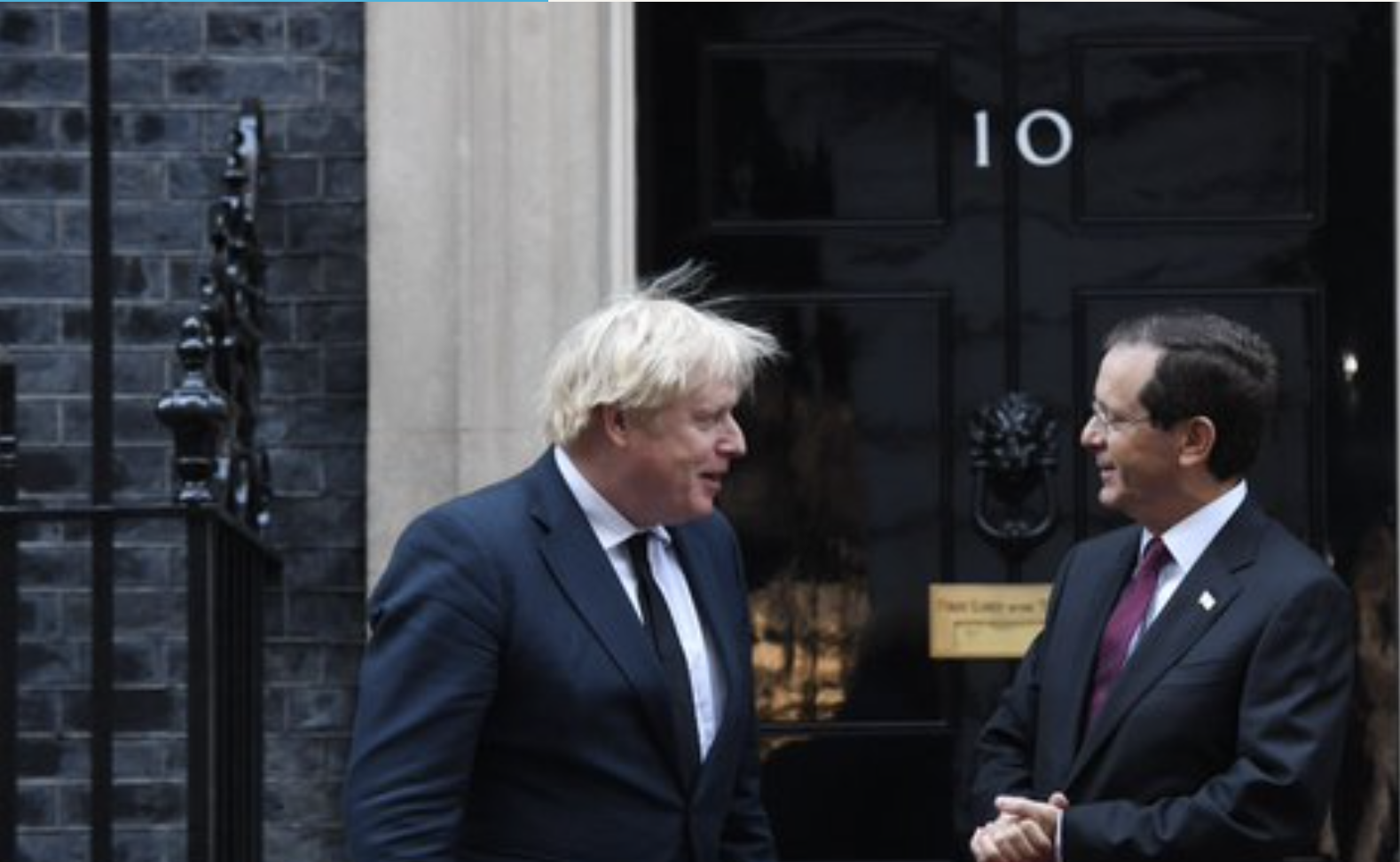What happened: President Isaac Herzog completed his trip to the UK with a meeting with Prime Minister Boris Johnson.
- Herzog implored Johnson to take a tough stance in nuclear negotiations with Iran, due to restart in Vienna next week. Herzog said: “We are looking forward for our allies in the P5+1 to be as tough as possible because we do not believe that they [Iran] are operating in a bona fide manner, and only if all options are on the table may things move in the right direction.”
- Johnson acknowledged Herzog’s concern, noting the world “doesn’t have much time” to stop Iran from developing a nuclear weapon.
- Similar concerns were echoed yesterday in Israel. Speaking at the Reichmann University Security and Policy Conference in Herzliya, Prime Minister Naftali Bennett related to Iran saying: “For three decades, Israel’s number one enemy has been the Islamic Republic of Iran. The scope of the resources Israel has invested to deal with the Iranian threat—in military, diplomatic, economic, and covert and open technological terms—has been enormous. It seems like there is a need to think about what we’ve achieved, look at (this investment) whether we need to recalibrate this massive effort.”
- Bennett added: “When I walked into the Prime Minister’s Office I was stunned by the gap between the rhetoric and action. I found a worrying distance between statements like ‘we’ll never allow Iran to become a nuclear state’ and the situation we inherited. Iran’s nuclear programme is at a very advanced stage; it’s enrichment is broader and more advanced than ever.”
- Defence Minister Benny Gantz also related to the role of the international community, saying, “In facing the (Iranian) threat, the world has many tools it may employ, and it must add a ‘Plan B’ to the diplomatic option. We will continue to work in full cooperation with our American friends and with additional countries. The international community has the tools as well as an interest in stopping Iran, which harms the (global) economy, foreign policy, security and moral values. There is no doubt that a diplomatic solution is preferable, but alongside it, the use of force should be on the table – since it is the continuation of diplomacy by other means. Sometimes the use and demonstration of force can prevent the need for an even stronger use of force.”
- Speaking at the same conference, Finance Minister Avigdor Liberman said: “We must take into consideration the fact that the Iranians are serious people, the way things are going it is clear that the world powers are determined to sign an agreement with Iran at any price … The Iranians want to destroy the State of Israel and they have every intent to accomplish that goal.”
Context: The nuclear talks are due to resume next week, with the P5+1 [US, UK, France, Russia, China and Germany] keen to return to the parameters agreed in the 2015 JCPOA agreement.
- There is a concern that Iran has increased their stockpile of enriched uranium and knowledge of the enrichment process to make the 2015 arrangement almost irrelevant. According to the latest assessment of the UN nuclear monitor the IAEA, Iran’s stockpile is now much higher than the agreement allows. As of this month they estimate Iran has 113.8 kg enriched to 20 per cent, up from 84.3 in September, and 17.7 kg enriched up to 60 per cent, up from 10 kg.
- Iran continues to try and supply weapons to their proxies on Israel’s border. Last night Syrian sources claims the Israeli Air Force attack struck several military positions in Homs in central Syria, thought to be a shipment of Iranian weapons destined for Hezbollah.
- Yesterday Defence Minister Gantz revealed that Iran even tried to transfer explosives from Syria to terrorists based in the West Bank using an unmanned aircraft.
- Bennett also noted in his speech yesterday that “Iran has surrounded Israel with missiles at a time that they are sitting in Tehran. They pester us from afar, inflict damage on us and sap our energy, almost without leaving their homes. They make us bleed without paying a price for it … the conclusion must be drawn that hunting down the terrorist-of-the-day that is operated by the Quds Force is just no longer logical. We have to get to the dispatchers.” This would imply a new approach in the future in which Israel would strike Iran directly for an attack carried out by one of their proxy militias.
- Israel will continue its private dialogue with the US and other allies over the JCPOA nuclear deal, but has expressed concern that US deterrence is not as robust as it should be, particularly with regard to Iranian attacks on US positions in the region.
Looking ahead: Israeli leaders and analysts will be focused on the talks in Vienna next week. Bennett asserted yesterday that “even if there is a return to the nuclear agreement — Israel isn’t a party to the agreement. Israel isn’t bound by the agreement”.
- Israel leaders have insisted that Israel will retain its freedom of action against Iran under any political circumstances
Please share this article so that others can discover The BFD.

